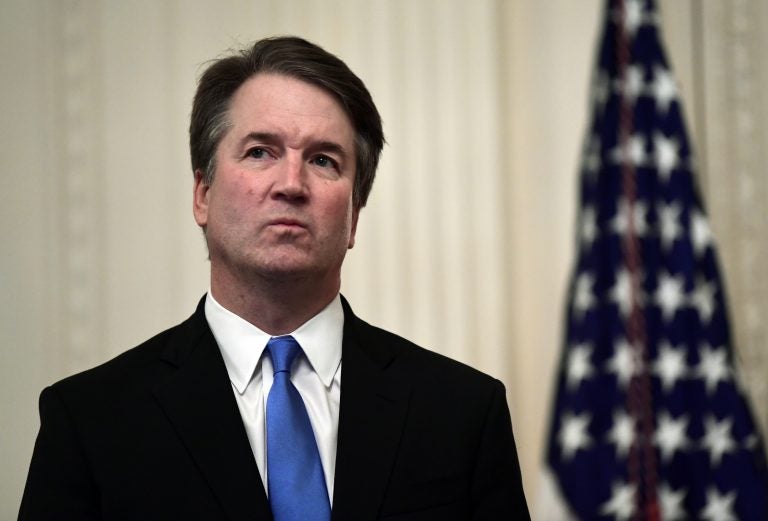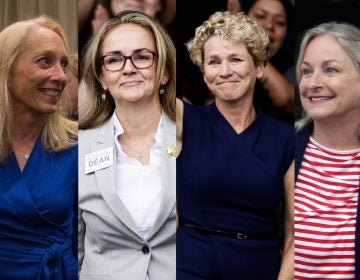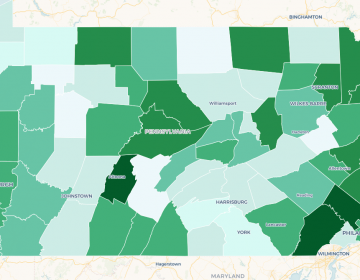Pennsylvania Democrats’ fortunes improve, but what about Kavanaugh?
A national analyst upgrades Democratic chances in the state's congressional elections, but fallout from Kavanaugh controversy is unknown quantity.

Supreme Court Justice Brett Kavanaugh stands before a ceremonial swearing-in in the East Room of the White House in Washington, Monday, Oct. 8, 2018. (Susan Walsh/AP Photo)
National analysts have been steadily upgrading the Democrats’ chances of winning contested congressional seats in Pennsylvania, including two in the Philadelphia area.
But Democrats’ improving fortunes could come to halt if Republicans get the boost they’re claiming from controversy over Brett Kavanaugh’s confirmation as a U.S. Supreme Court justice.
The nonpartisan Inside Elections newsletter has changed its rating in the hotly-contested Bucks County congressional race from “lean Republican” to “toss up,” a move the Cook Political Report also made.
Inside Politics editor Nathan Gonzales said in interview that incumbent Republican U.S. Rep. Brian Fitzpatrick is well known and a strong candidate for re-election.
“But it’s the type of district that we’ve just seen moving away from Republicans this cycle,” Gonzales said. “A suburban district where voters are upset at the president, and they’re looking to take it out on Republicans, or send Democrats to Washington as a check on the president.”
The Democratic candidate, Scott Wallace, is a wealthy philanthropist who has been able to self-fund a robust campaign, Gonzales noted.
Gonzales also said the 7th District seat in the Lehigh Valley vacated by Republican Charlie Dent is now likely to go Democratic.
The Democrat, attorney Susan Wild, has been getting help from national Democratic groups. Her opponent, Lehigh County Commissioner Marty Nothstein, was stung by an unspecified sexual misconduct complaint that seems to have gone nowhere, but did hurt his fundraising.
“When you’re running against the wind in an open seat and trying to get known, you have to run a near-perfect race,” Gonzales said. “Any little stumble can hurt that process.”
What about Kavanaugh?
Inside Elections changed its congressional ratings at the height of the battle over Kavanaugh’s confirmation to the U.S. Supreme Court.
Many Republicans — mostly notably Senate Majority Leader Mitch McConnell — said the bitter dispute over claims over sexual assault fired up their base and improved their prospects in the November election.
Gonzales isn’t saying they’re wrong, but he thinks it’s too early to tell.
“The worst time to evaluate the political fallout from a big event is either right in the middle of it or right after it,” he said.
“It’s easy for the media to come up with narratives and for there to be a Twitter bubble,” Gonzales said. “But I’m not convinced that everyone was following every specific detail of it, and I’m interested to see some real polling and find out how real voters feel about it and whether it changed their opinion or their likelihood of voting.”
Some data show a variety of early opinions on the Kavanaugh effect.
An NPR/PBS/Marist survey and a Quinnipiac poll showed an improvement in Republican enthusiasm in the immediate aftermath of the confirmation battle.
Polling analyst Nate Silver said the evidence is mixed, but there’s a case for a Republican bump, particularly in U.S. Senate races.
And veteran analyst Charles Cook wrote last week in the middle of the fracas that it will be Trump, not Kavanaugh, who influences voters in November.
WHYY is your source for fact-based, in-depth journalism and information. As a nonprofit organization, we rely on financial support from readers like you. Please give today.





